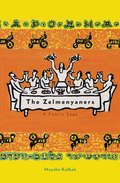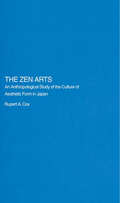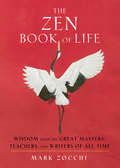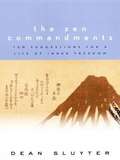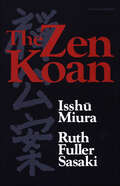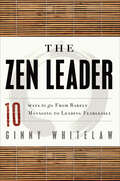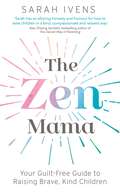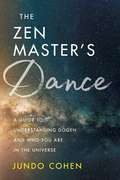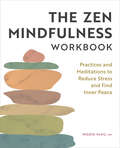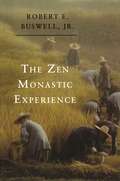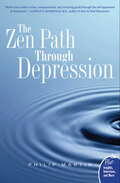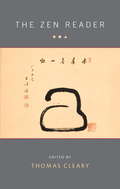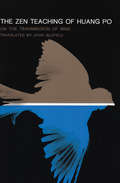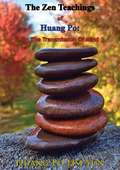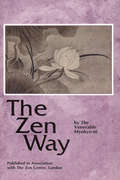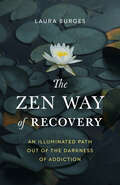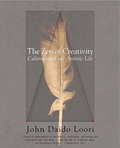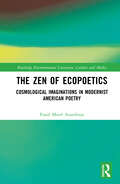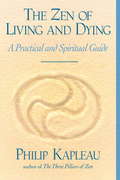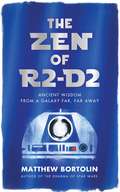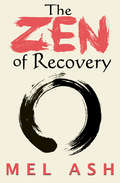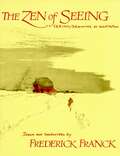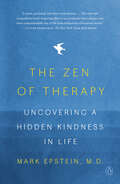- Table View
- List View
The Zelmenyaners: A Family Saga
by Hillel Halkin Moyshe Kulbak Sasha SenderovichThis is the first complete English-language translation of a classic of Yiddish literature, one of the great comic novels of the twentieth century. The Zelmenyaners describes the travails of a Jewish family in Minsk that is torn asunder by the new Soviet reality. Four generations are depicted in riveting and often uproarious detail as they face the profound changes brought on by the demands of the Soviet regime and its collectivist, radical secularism. The resultant intergenerational showdowns—including disputes over the introduction of electricity, radio, or electric trolley—are rendered with humor, pathos, and a finely controlled satiric pen. Moyshe Kulbak, a contemporary of the Soviet Jewish writer Isaac Babel, picks up where Sholem Aleichem left off a generation before, exploring in this book the transformation of Jewish life.
The Zen Arts: An Anthropological Study of the Culture of Aesthetic Form in Japan (Royal Asiatic Society Books)
by Rupert CoxThe tea ceremony and the martial arts are intimately linked in the popular and historical imagination with Zen Buddhism, and Japanese culture. They are commonly interpreted as religio-aesthetic pursuits which express core spiritual values through bodily gesture and the creation of highly valued objects. Ideally, the experience of practising the Zen arts culminates in enlightenment.This book challenges that long-held view and proposes that the Zen arts should be understood as part of a literary and visual history of representing Japanese culture through the arts. Cox argues that these texts and images emerged fully as systems for representing the arts during the modern period, produced within Japan as a form of cultural nationalism and outside Japan as part of an orientalist discourse.Practitioners' experiences are in fact rarely referred to in terms of Zen or art, but instead are spatially and socially grounded. Combining anthropological description with historical criticism, Cox shows that the Zen arts are best understood in terms of a dynamic relationship between an aesthetic discourse on art and culture and the social and embodied experiences of those who participate in them.
The Zen Book of Life: Wisdom from the Great Masters, Teachers, and Writers of All Time
by Mark ZocchiInspired by the teachings of the Buddha and other great masters, teachers, and writers, this is a book designed to help people connect to their inner divinity and find their spiritual path. It is overflowing with profound quotes, sayings, and insights, each presented alone, allowing the reader to dip in at any time. Each reading is guaranteed to inspire immediately and provide food for thought.Quotations and sayings have been chosen from Gautama Buddha and other "buddhas"--masters of spirituality and inspiration, such as Milarepa, Longchenpa, his Holiness the 14th Dali Lama, Thich Nhat Hanh, and Sogyal Rinpoche, along with other "greats" including Cicero, Rumi, Lao Tzu, Mother Teresa, and Shakespeare. <P><P>A wonderful book to place on your office desk, coffee table, or bookshelf or by your bed, it is designed to provide daily comfort, wisdom, and spiritual nourishment.
The Zen Commandments: Ten Suggestions for a Life of Inner Freedom
by Dean SluyterThe Ten Commandments tell us how to behave, but they don't say much about the inner awareness from which outer behavior springs. Do the right thing, of course-- but better yet, find your inner light and doing the right thing becomes as natural as breathing. Here are ten powerful nudges toward that light. Drawing on sources from Zen stories and the Bible to jazz and rock 'n' roll, from American movies to Tibetan meditative techniques, Dean Sluyter steers clear of dogma and emphasizes what works-- a sort of spiritual street smarts. He shows that the state of boundless freedom and happiness isn't something distant or exotic, but is right here, while you're stuck in traffic or taking out the trash. And revisiting the Ten Commandments, he shows how on a deeper level they offer some surprising enlightenment wisdom of their own. .
The Zen Koan: Its History and Use in Rinzai Zen
by Isshu Miura Ruth Fuller SasakiThe first scholarly examination in any language of the historical development and traditional method of koan study in Zen Buddhism. Foreword by Ruth Fuller Sasaki; Index; ink drawings by Hakuin Ekaku.A Helen and Kurt Wolff Book.
The Zen Leader: 10 Ways to Go From Barely Managing to Leading Fearlessly
by Ginny WhitelawA guide to using pressure to be a better leader through principles of Zen Buddhism.Leaders today face nearly impossible tasks. Forced to do more with less, expand globally, innovate quickly, inspire broadly and—oh, yes—balance work and family. How can one manage all this pressure?The Zen Leader does not encourage you simply to “be peaceful.” Neither does it suggest you work harder, faster, or ignore the pressure. Quite the opposite: it’s about using the pressure to propel “flips” in consciousness that create transformational leaders, leaders who create the future with joy and enthusiasm, rather than drive themselves and their people to exhaustion.The Zen Leader guides you through ten “flips” that take you from barely managing to mastering change—not by doing more, zoning out, or pretending you have all the answers. Chapter by chapter, you’ll learn how to make the “flips” that reframe your life, your leadership, and your world. Discover how you can get out of your own way and realize the Zen Leader in you.Praise for The Zen Leader“The Zen Leader provides a calm and reassuring voice—telling us what is important about leadership and about ourselves. She distills leadership to its essence, and offers simple, easily understandable tools for any current or aspiring leader to understand, use, and build on his or her own natural gifts.” —David Dotlich, chairman of Pivot and coauthor of Why CEOs Fail; Head, Heart, and Guts; and other books on leadership“The chapter entitled “From Controlling to Connecting” will change how you interact with others, and will enrich your life. You will see the vision of what you want our world to be and help strengthen the business connections we all need.” —Blythe McGarvie, author of Shaking the Globe“Before you can effectively lead others, you must be able to control yourself first. Dr. Whitelaw invites us on a journey of self-discovery using easy-to-follow exercises. By learning to experience for yourself the power of a unified mind and body, you will begin to taste your full potential.” —David Shaner, author of The Seven Arts of Change
The Zen Mama: Your guilt-free guide to raising brave, kind children
by Sarah IvensLet go of parenting expectations and fears to raise courageous, confident children.The Zen Mama philosophy is that mother and child complement each other in adventures and experiences, always putting safety first but without getting caught up in the anxieties, drama, impossible expectations and mental baggage that too often comes along with modern parenting. Learning to become a Zen Mama will help you grow and nurture a Zen Child - someone who isn't afraid to be different, who can stand up for himself or his friends, and can travel the world and experiment with new things without being overwhelmed with self-doubt or being scared. Full of facts, actionable advice and practical tips, this book will be about combining the heart and the head with what works for you and your family, not comparing yourselves to others or meeting a societal standard. It will support and nurture the mother's journey like a wise and sympathetic friend and offers ideas and experience rather than judgement.The Zen Mama will help you to find your purpose as a mother. It will instil the self-belief you need to help create a resilient, creative, caring and smart child - and help to survive the journey.
The Zen Mama: Your guilt-free guide to raising brave, kind children
by Sarah IvensLet go of parenting expectations and fears to raise courageous, confident children.The Zen Mama philosophy is that mother and child complement each other in adventures and experiences, always putting safety first but without getting caught up in the anxieties, drama, impossible expectations and mental baggage that too often comes along with modern parenting. Learning to become a Zen Mama will help you grow and nurture a Zen Child - someone who isn't afraid to be different, who can stand up for himself or his friends, and can travel the world and experiment with new things without being overwhelmed with self-doubt or being scared. Full of facts, actionable advice and practical tips, this book will be about combining the heart and the head with what works for you and your family, not comparing yourselves to others or meeting a societal standard. It will support and nurture the mother's journey like a wise and sympathetic friend and offers ideas and experience rather than judgement.The Zen Mama will help you to find your purpose as a mother. It will instil the self-belief you need to help create a resilient, creative, caring and smart child - and help to survive the journey.
The Zen Master's Dance: A Guide to Understanding Dogen and Who You Are in the Universe
by Jundo CohenZen Master's Dance makes some of Zen&’s subtlest teaching deeply personal and freshly accessible.Eihei Dogen—the thirteenth-century Japanese Zen Master of peerless depth and subtlety—heard the music of the universe that sounds as all events and places, people, things, and spaces. He experienced reality as a great dance moving through time, coming to life in the thoughts and acts of all beings. It is a most special dance, the dance that the whole of reality is dancing, with nothing left out. All beings are dancing, and reality is dancing as all beings. In The Zen Master&’s Dance, Jundo Cohen takes us deep into the mind of Master Dogen—and shows us how to join in the great and intimate dance of the universe. Through fresh translations and sparkling teaching, Cohen opens up for us a new way to read one of Buddhism&’s most remarkable spiritual geniuses.
The Zen Mindfulness Workbook: Practices and Meditations to Reduce Stress and Find Inner Peace
by Ingrid Yang MDCultivate calm through Zen mindfulness It's all too easy to walk through the world preoccupied by our endless thoughts. But that can get in the way of living in the moment and truly experiencing all that life has to offer. This workbook shows you how to quiet your mind and release worry. It examines mindfulness through the lens of Zen teachings and provides exercises that leave you feeling calm, present, and open to possibility. Learn about Zen—Explore the basic tenets of Zen Buddhism, how they can help you let go, and how they enable you to connect with yourself. Take a deep dive into mindfulness—Understand the Seven Pillars of mindfulness, how to achieve a mindful state, and the positive effects of mindfulness, such as better focus and lower blood pressure. Develop your practice—Create your own Zen-based mindfulness practice with a wide range of guided meditations, practical exercises, and inspiring affirmations. Start living mindfully and alleviate anxiety with this comprehensive Zen mindfulness workbook.
The Zen Monastic Experience: Buddhist Practice in Contemporary Korea
by Robert E. BuswellRobert Buswell, a Buddhist scholar who spent five years as a Zen monk in Korea, draws on personal experience in this insightful account of day-to-day Zen monastic practice. In discussing the activities of the postulants, the meditation monks, the teachers and administrators, and the support monks of the monastery of Songgwang-sa, Buswell reveals a religious tradition that differs radically from the stereotype prevalent in the West. The author's treatment lucidly relates contemporary Zen practice to the historical development of the tradition and to Korean history more generally, and his portrayal of the life of modern Zen monks in Korea provides an innovative and provocative look at Zen from the inside.
The Zen Path Through Depression
by Philip MartinPhilip Martin’s The Zen Path Through Depression is a compassionate and spiritual approach to rediscovering joy.Using easy-to-follow techniques and practical advice, Philip Martin shows you how to ease depression through the spiritual practice of Zen. His lessons, full of gentle guidance and sensitivity, are a product of his experiences in using Zen practices and wisdom to alleviate his own depression.Each chapter focuses on a different aspect of depression and recommends a meditation or reflection. With these tools, coping with depression becomes a way to mend the spirit while enriching the soul.“Martin has written a wise, compassionate, and nurturing guide through the self-oppression of depression.” —Harold H. Bloomfield, M.D., bestselling author of How to Heal Depression“A wonderful, strong breath directly into the heart. Martin lays a very healing foundation for addressing suffering with love and awareness. For those lost in unhappiness, The Zen Path Through Depression offers the possibility of joy. Happiness comes from getting what you want, joy from being who you truly are.” —Stephen Levine, bestselling author of Unattended Sorrow: Recovering from Loss and Reviving the Heart“Martin offers clear-eyed Zen medicine for those afflicted with depression and for everyone who seeks to use their fluctuating mental states to see more clearly. His exercises are particularly helpful in avoiding the pitfalls of obsessive or stagnant practice.” —Sensei Pat Enkyo O’Hara, Village Zendo, New York
The Zen Reader
by Thomas ClearyFounded by Bodhidharma centuries ago in China, Zen and its teachings have since spread widely, exerting a tremendous cultural influence not only across Asia, but also the modern West. To this day, Zen inspires young and old, from all walks of life, to see the world with fresh eyes--beyond our usual assumptions and prejudices. This compendium of a thousand years of Zen teaching presents the essence of the tradition through stories, sayings, talks, and records of heart-to-heart encounters with Zen masters. The great expositors of the tradition, whose voices are recounted here, encourage us to let go of our clinging and intellectual grasping, and to open ourselves to embrace reality exactly as it is.
The Zen Teaching of Huang Po: On the Transmission of Mind (Books That Changed the World)
by Huang PoThis complete collection of teachings by the 9th century Zen Master has been an essential text in the study of Zen for centuries—now available in English.This translation of the original collection of sermons, dialogues, and anecdotes of Huang Po, the illustrious Chinese master of the Tang Dynasty, allows the Western reader to gain an understanding of Zen from the original source, one of the key works in its teachings. It also offers deep and often startling insights into the rich treasures of Eastern thought. Nowhere is the use of paradox in Zen illustrated better than in the teaching of Huang Po, who is regarded as the founder of the great Lin Chi sect. He demonstrates that the experience of intuitive knowledge, which reveals to a man what he is, cannot be communicated in words. With the help of these paradoxes, beautifully and simply presented in this collection, Huang Po could set his disciples on the right path. It is in this fashion that the Zen master lead his listener into truth, often by a single phrase designed to destroy his particular demon of ignorance.John Blofeld’s translation reflects his deep understanding of Zen and gives this historical text a clear and faithful presentation.
The Zen Teachings of Huang Po: On The Transmission Of Mind
by John Blofeld P’ei Hsiu Huang Po His YunThis Historical text from the direct teaching of the Zen master, Huang Po, allows the Western reader to gain an understanding of Zen from the original source, one of the key works in its teachings; it also offers deepening and often startling insights into the rich treasures of Eastern thought.Huang Po, also known as Hsi Yun, is believed to have died as late as 850 A.D. He is regarded in a sense as the founder of the great Lin Chi sect. He lived below the Vulture Peak on Mount Huang Po, in the district of Kao An. Like most Zen masters, Huang Po taught in parables which were delivered as sermons, anecdotes, and dialogues. These have been collected here to present the teachings of the Master himself. He compares the mind to the sun travelling through the sky, sending forth light uncontaminated by the finest particle of dust. For those who have discovered the nature of Reality, he says, there is nothing old or new, concepts become meaningless and reason leads to error.Nowhere is the use of paradox in Zen illustrated better than in the teachings of Huang Po, who shows how the experience of intuitive knowledge which reveals to a man what he really is, cannot be communicated by words. With the help of these paradoxes, beautifully and simply presented in this collection, Huang Po could set his disciples on the right path. It is in this fashion that the Zen master leads his listener into the truth, often by a single phrase designed to destroy his particular demon of ignorance.Many of the dialogues recorded in The Zen Teaching of Huang Po took place in public assembly, generally with hundreds of the Master's followers in attendance. This text is remarkable for its purity of thought and speech. John Blofeld's translation reflects his deep understanding of Zen and gives it a crystal clear presentation. In addition, there are an introduction and explanatory notes that make this original and revered text even more valuable to the contemporary reader.
The Zen Way
by Myokyo-NiMyokyo-ni is the Buddhist name of Dr. Irmgard Schloegl, who directs the Zen center Shobo-an in London. Here she seeks to describe Zen and Zen practice from a few different approaches, presenting basic Buddhist thought as well as an overview of the life of the historical Buddha. She gives a section on training in a Japanese Rinzai Zen monastery-perhaps the most unique feature of the book, although her presentation is rather impersonal. Her final section, "Fundamentals," is rambling and might have benefited from further organization and subdivision. The author's style throughout is decidedly Western, with a psychological, philosophical tone that does not sit comfortably with some of the more esoteric writings in the field. For an introduction to the subject, there are better sources, such as Robert Aitken's Taking the Path of Zen (Farrar, 1982). For serious students of Zen, there are valuable insights hidden in the sometimes difficult but heartfelt analyses scattered through the book.
The Zen Way
by Myokyo-NiMyokyo-ni is the Buddhist name of Dr. Irmgard Schloegl, who directs the Zen center Shobo-an in London. Here she seeks to describe Zen and Zen practice from a few different approaches, presenting basic Buddhist thought as well as an overview of the life of the historical Buddha. She gives a section on training in a Japanese Rinzai Zen monastery-perhaps the most unique feature of the book, although her presentation is rather impersonal. Her final section, "Fundamentals," is rambling and might have benefited from further organization and subdivision. The author's style throughout is decidedly Western, with a psychological, philosophical tone that does not sit comfortably with some of the more esoteric writings in the field. For an introduction to the subject, there are better sources, such as Robert Aitken's Taking the Path of Zen (Farrar, 1982). For serious students of Zen, there are valuable insights hidden in the sometimes difficult but heartfelt analyses scattered through the book.
The Zen Way of Recovery: An Illuminated Path Out of the Darkness of Addiction
by Laura BurgesAn accessible, compassionate guide to Buddhist principles and practices that can help support recovery from addictions and addictive behaviors—written by an experienced lay teacher with long-term recovery.For anyone struggling with addiction, Buddhism offers powerful, grounding wisdom and tools to help support recovery. In The Zen Way of Recovery, Laura Burges shares her experience as a dedicated Zen practitioner who came to terms with her own addiction to alcohol and found support for her recovery. Through the lens of Buddhist teachings, Burges offers tools and practices which, together with the help of recovery programs, can offer a road to sobriety. Burges is an experienced and compassionate guide, and her message is resonant for people with any type of addictive behavior—and for people who aren&’t necessarily familiar with Buddhism. Her teachings are drawn from the Buddha's life and teachings (specifically the Eight Awarenesses of the Awakened Being and the Six Paramitas), and the wisdom of Japanese Buddhist priest Dogen Zenji, the founder of the Soto school of Zen, among others. Burges emphasizes the importance of being in an active recovery program, and the teachings and practices she offers in each chapter—including reflections, journaling prompts, meditations, instructions for setting up and altar and zazen—are both a perfect adjunct and powerful reinforcement. Examples of reflections and journaling prompts include: Do you still hear the critical, contemptuous, sarcastic voice of a parent or partner in your own head?Do you sometimes hear yourself mirroring this negative voice with others?What were the models of relationship that you grew up with?What are ways that you can cultivate more patience?Check in with yourself to see if tiredness, hunger, loneliness, or anger is affecting your thinking in the moment.
The Zen of Creativity
by John Daido LooriFor many of us, the return of Zen conjures up images of rock gardens and gently flowing waterfalls. We think of mindfulness and meditation, immersion in a state of being where meaning is found through simplicity. Zen lore has been absorbed by Western practitioners and pop culture alike, yet there is a specific area of this ancient tradition that hasn't been fully explored in the West. Now, in The Zen of Creativity, American Zen master John Daido Loori presents a book that taps the principles of the Zen arts and aesthetic as a means to unlock creativity and find freedom in the various dimensions of our existence. Loori dissolves the barriers between art and spirituality, opening up the possibility of meeting life with spontaneity, grace, and peace.Zen Buddhism is steeped in the arts. In spiritual ways, calligraphy, poetry, painting, the tea ceremony, and flower arranging can point us toward our essential, boundless nature. Brilliantly interpreting the teachings of the artless arts, Loori illuminates various elements that awaken our creativity, among them still point, the center of each moment that focuses on the tranquility within; simplicity, in which the creative process is uncluttered and unlimited, like a cloudless sky; spontaneity, a way to navigate through life without preconceptions, with a freshness in which everything becomes new; mystery, a sense of trust in the unknown; creative feedback, the systematic use of an audience to receive noncritical input about our art; art koans, exercises based on paradoxical questions that can be resolved only through artistic expression. Loori shows how these elements interpenetrate and function not only in art, but in all our endeavors.Beautifully illustrated and punctuated with poems and reflections from Loori's own spiritual journey, The Zen of Creativity presents a multilayered, bottomless source of insight into our creativity. Appealing equally to spiritual seekers, artists, and veteran Buddhist practitioners, this book is perfect for those wishing to discover new means of self-awareness and expression--and to restore equanimity and freedom amid the vicissitudes of our lives.From the Hardcover edition.
The Zen of Ecopoetics: Cosmological Imaginations in Modernist American Poetry (Routledge Environmental Literature, Culture and Media)
by Enaiê Mairê AzambujaThis book is the first comprehensive study investigating the cultural affinities and resonances of Zen in early twentieth-century American poetry and its contribution to current definitions of ecopoetics, focusing on four key poets: William Carlos Williams, Marianne Moore, Wallace Stevens, and E.E. Cummings. Bringing together a range of texts and perspectives and using an interdisciplinary approach that draws on Eastern and Western philosophies, including Zen and Taoism, posthumanism and new materialism, this book adds to and extends the field of ecocriticism into new debates. Its broad approach, informed by literary studies, ecocriticism, and religious studies, proposes the expansion of ecopoetics to include the relationship between poetic materiality and spirituality. It develops ‘cosmopoetics’ as a new literary-theoretical concept of the poetic imagination as a contemplative means to achieving a deeper understanding of the human interdependence with the non-human. Addressing the critical gap between materialism and spirituality in modernist American poetry, The Zen of Ecopoetics promotes new forms of awareness and understanding about our relationship with non-human beings and environments. It will be of interest to scholars, researchers, and students in ecocriticism, literary theory, poetry, and religious studies.
The Zen of Living and Dying: A Practical and Spiritual Guide
by Philip KapleauTo live life fully and die serenely--surely we all share these goals, so inextricably entwined. Yet a spiritual dimension is too often lacking in the attitudes, circumstances, and rites of death in modern society. Kapleau explores the subject of death and dying on a deeply personal level, interweaving the writings of Western religions with insights from his own Zen practice, and offers practical advice for the dying and their families.
The Zen of R2-D2: Ancient Wisdom from a Galaxy Far, Far Away
by Matthew BortolinEntertaining and engaging, this new follow-up to Wisdom&’s bestseller The Dharma of Star Wars stands on its own and will captivate a broad audience with the Star Wars story from a Buddhist perspective.Did you ever wonder why R2-D2 is: Always calm and cool under pressure, The key to the rebellion&’s survival, The one who never fails to save the day? Could it be because he&’s secretly a Zen master? Discover your inner R2—and the truth about who you really are! This delightful and illuminating romp unfolds in the form of a fictional dialogue between the author—a die-hard Star Wars devotee with a deep connection to Zen—and two cosplayers dressed as C-3PO and R2-D2 who insist on being called by their character names. Along the way, you&’ll come to see what everyone&’s favorite astromech can teach us about peace, happiness, and life&’s true meaning.
The Zen of Recovery
by Mel AshA practical synthesis of AA&’s Twelve Steps and Zen&’s Eightfold Path. In this compelling blend of East and West, Mel Ash shows how Zen mind and practice connect to the heart of recovery. Courageously drawing from his lifetime of experience as an abused child, alcoholic, Zen student, and dharma teacher, Ash presents a practical synthesis of Alcoholics Anonymous&’s Twelve Steps and Zen&’s Eightfold Path. You don&’t have to be Buddhist to appreciate the healing power of The Zen of Recovery. The book makes Zen available to all seeking to improve the quality of their spiritual and everyday lives. It also includes practical instructions on how to meditate and put the book into action. Its message will help readers live more profoundly &“one day at a time.&”
The Zen of Seeing: Seeing/Drawing as Meditation
by Frederick FranckSeeing/Drawing is spiritual discipline, a "Zen method" admirably suited to the active temperament, and a way of contemplation by which all things are made new, by which the world is freshly experienced at each moment. <p><p> A renown Dutch artist offers his concept of seeing and drawing as a discipline by which the world may be rediscovered, a way of experiencing Zen. Drawn and handwritten by Frederick Franck
The Zen of Therapy: Uncovering a Hidden Kindness in Life
by Mark EpsteinA remarkable exploration of the therapeutic relationship, Dr. Mark Epstein reflects on one year&’s worth of therapy sessions with his patients to observe how his training in Western psychotherapy and his equally long investigation into Buddhism, in tandem, led to greater awareness—for his patients, and for himself For years, Dr. Mark Epstein kept his beliefs as a Buddhist separate from his work as a psychiatrist. Content to use his training in mindfulness as a private resource, he trusted that the Buddhist influence could, and should, remain invisible. But as he became more forthcoming with his patients about his personal spiritual leanings, he was surprised to learn how many were eager to learn more. The divisions between the psychological, emotional, and the spiritual, he soon realized, were not as distinct as one might think. In The Zen of Therapy, Dr. Epstein reflects on a year&’s worth of selected sessions with his patients and observes how, in the incidental details of a given hour, his Buddhist background influences the way he works. Meditation and psychotherapy each encourage a willingness to face life's difficulties with courage that can be hard to otherwise muster, and in this cross-section of life in his office, he emphasizes how therapy, an element of Western medicine, can in fact be considered a two-person meditation. Mindfulness, too, much like a good therapist, can &“hold&” our awareness for us—and allow us to come to our senses and find inner peace. Throughout this deeply personal inquiry, one which weaves together the wisdom of two worlds, Dr. Epstein illuminates the therapy relationship as spiritual friendship, and reveals how a therapist can help patients cultivate the sense that there is something magical, something wonderful, and something to trust running through our lives, no matter how fraught they have been or might become. For when we realize how readily we have misinterpreted our selves, when we stop clinging to our falsely conceived constructs, when we touch the ground of being, we come home.
